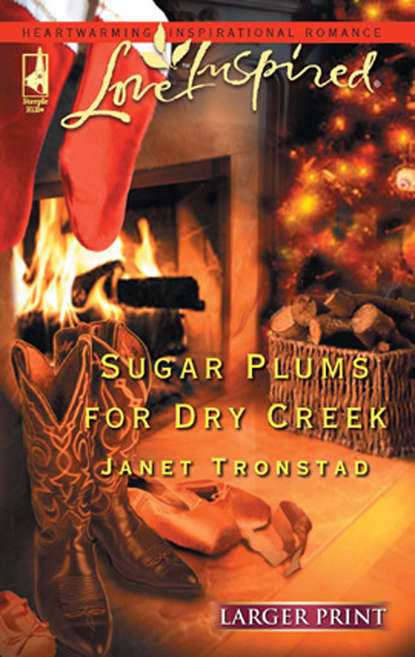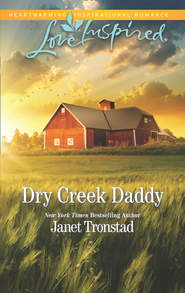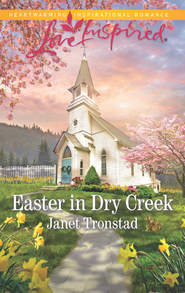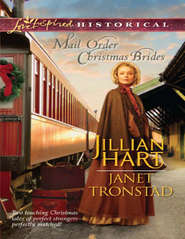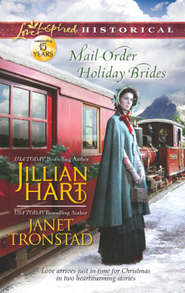По всем вопросам обращайтесь на: info@litportal.ru
(©) 2003-2024.
✖
Sugar Plums for Dry Creek
Автор
Год написания книги
2018
Настройки чтения
Размер шрифта
Высота строк
Поля
“You know someone like that?”
Judd had to admit he didn’t. He’d only moved to Dry Creek this past spring. He’d been working long and hard plowing and then seeding the alfalfa and wheat crops. He hadn’t taken time to get to know any of his neighbors yet.
He wished now that he had accepted one of the invitations to church he’d received since he’d been here. An older woman, Mrs. Hargrove, had even driven out to the ranch one day and invited him. She’d looked so friendly he’d almost promised to go, but he didn’t.
What would a man like him do in church anyway? He wouldn’t know when to kneel or when to sing or when to bow his head. No, church wasn’t for him.
Now he wished he had gone to church anyway, even if he’d made a fool of himself doing so. Mrs. Hargrove would probably help someone who went to her church. She wasn’t likely to help a stranger though. Who would be?
“Maybe we could put an ad in the paper.”
Barbara just looked at him. “We don’t have time for that.”
Judd had to admit she was right.
“Besides, this is something big—the kind of thing family members do to help each other,” Barbara said with such conviction that Judd believed her.
Not that he was an expert on what family members did to help each other. He couldn’t remember his uncle ever doing him a kindness, and the man was the only family Judd had ever known. His uncle had lost all contact with his cousin who was Barbara’s father.
He had to admit he had been excited at first when Barbara had come to his doorstep. It was nice to think he had family somewhere in this world.
He looked over at the kids and saw that they were sitting still as stones. Kids shouldn’t be so quiet.
“Are they trained?” he asked.
Barbara looked at him blankly for a moment. “You mean potty-trained?”
He nodded.
“Of course! Amanda here is five years old. And Bobby is six. They practically take care of themselves.”
Barbara didn’t pause before she continued. “And it might only be for a few days. Just enough time for me to drive down to Denver and check out that women’s shelter. I want to be sure they’ll take us before I drag the kids all that way.”
Barbara had arrived in an old car that had seen better days, but it had gotten her here, so Judd figured it would get her to Denver.
Still, if she had car trouble, he knew it would be hard to take care of the kids while she saw to getting the thing fixed. He supposed—maybe—
“I guess things will be slow for the next few days,” Judd said. He’d finished putting up the hay, and he had enough of the fence built so his thirty head of cattle could graze in the pasture by the creek. He meant to spend the next few days working on the inside of the house anyway before he turned back to building the rest of the fence. He supposed two trained kids wouldn’t be too much trouble.
Judd didn’t exactly say he’d keep the kids, but he guessed Barbara could tell he’d lowered his resistance, because she turned her attention to the kids, telling them they were going to stay with Cousin Judd and she’d be back in a few days. That was at the end of August. It was mid-November now.
Judd still hadn’t finished all of the fencing, and it was already starting to snow some. If he waited any longer, the ground would be frozen too far down to dig fence holes. That’s why he was at the hardware store today getting nails and talking to the old men by the stove.
Judd watched the old men as they smiled at the kids now.
Jacob nodded slowly as he looked at Amanda. “I saw your mama when she brought you and your brother here. She stopped to ask directions. You’re right, she was pretty, too.”
“My mama’s going to come back and get us real soon,” Bobby said.
Jacob nodded. “I expect she will.”
Judd gave him a curt nod of thanks. Barbara had asked for a few days, but Judd had figured he’d give her a week. By now, she was at least two months overdue to pick up the kids.
Judd hadn’t told the kids he’d contacted the court that had issued the restraining order their mother had flashed in front of him and asked them to help find her. Fortunately Barbara had listed him as her next of kin on some paper they had. The court clerk had called every women’s shelter between here and Denver and hadn’t located Judd’s cousin.
Judd had had to do some persuasive talking to the clerk, because he didn’t want to mention the kids. He figured his cousin needed a chance to come back for them on her own.
“She’s just hurt her hand so she can’t write and tell us when,” Bobby added confidently.
“I expect that’s right. Mail sometimes takes a while,” Jacob agreed, and then added, “but then it only makes the letter more special when you do get it.”
The older men shifted in their seats. Judd knew they were all aware of the troubles Amanda and Bobby were having. They might not know the details, but he had told his landlady, Linda, back in the beginning of September that he was watching the children for his cousin for a couple of weeks. By now, everyone in Dry Creek probably knew there was something wrong.
Even if he was a newcomer, he would be foolish to think they hadn’t asked each other why the kids were still here. Of course, the old men were polite and wouldn’t ask a direct question, at least not in front of the kids, so they probably didn’t know how bad it all was. They probably thought Barbara had called and made arrangements for the kids to stay longer.
“Speaking of letters, maybe we could write a letter to the new woman and tell her we all want a bakery more than a ballet school,” Charley finally broke the silence with a suggestion.
“We can’t do that,” Jacob said with a sigh. “You don’t write a letter to someone who’s right across the street. No, we need to be neighborly and tell her to her face. It isn’t fair that we let her think she’ll make a go of it here with that school of hers.”
“Well, I can’t talk to her,” Charley said. “I’m the one who promised her everything would be fine.”
“Too bad she wasn’t the one who was deaf,” one of the other men muttered.
“I’m not deaf. I had a bad connection is all,” Charley said. “It could happen to anyone.”
“Maybe he could go talk to her,” the other man said, looking up at Judd. “He seems to hear all right.”
Judd felt his stomach knot up at the idea. “I got to count me out some nails. I’m building a fence.”
He walked back to the shelves that held the boxes of nails. Amanda and Bobby trailed along after him. Judd looked down at Bobby. “Why don’t you take your sister and go across to the café and put your order in for some of that cocoa? Tell Linda I’ll be along in a minute.”
The Linda who ran the café was also his landlady. She was renting him the Jenkins place, with an option to buy come next spring. Judd had saved the few thousand dollars the state had given him when it settled his uncle’s estate and added most of the other money he’d gotten to it for the past six years.
He’d started out working as a ranch hand, but the wages added up too slowly for him, and so he’d spent the next couple of years on the rodeo circuit. He’d earned enough in prize money to set himself up nicely. Right now, he had enough money in the bank to buy the Jenkins place, and he’d already stocked it with some purebred breeding cattle. He could have bought the place outright, but he wanted to take his time and be sure he liked it well enough before he made the final deal. So far, the ground had been fertile and the place quiet enough to suit him.
Judd watched Amanda and Bobby leave the hardware store before he reached into the nail bin and pulled out another nail. Fortunately, the older men had given up on the idea that he should talk to the new woman. They probably realized he’d botch the job.
Outside of talking with Linda at the café and smiling politely when Mrs. Hargrove had delivered the books the school had sent him when he’d decided to homeschool the kids, Judd hadn’t had a conversation with a woman since his cousin had left the kids with him. Well, unless you counted the court clerk he’d talked to on the phone.
Judd never had been much good at talking to women, at least not women who weren’t rodeo followers. He had no problem with women at rodeos, probably because they did most of the talking and he always knew what they wanted; they wanted a rodeo winner to escort them around town for the evening. That didn’t exactly require conversation, not with the yelling that spilled out of most rodeo hangouts in the evening.
As long as his boots were polished and his hat on straight, the rodeo women didn’t care if he was quiet. He was mostly for show anyway—if he was winning. If he wasn’t winning, they weren’t that interested in talking to him, or even interested in being with him.
The few temporary affairs he’d had with rodeo followers didn’t leave him feeling good about himself, so eventually he just declined invitations to party. By then he was counting up his prize money after every rodeo anyway, with an eye to when he could leave the circuit and set himself up on his own ranch.
In those years, Judd hadn’t known any women outside of rodeo circles, and he thought that was best. Judd never seemed to know what those women were thinking, and he didn’t even try to sort it all out. He liked things straightforward and to the point. The other kind of women—the kind that made wives—always seemed to say things in circles and then expect a man to know what they meant. For all Judd knew, they could be speaking Greek.
Judd had a feeling the new woman in Dry Creek was one of that kind of women.





